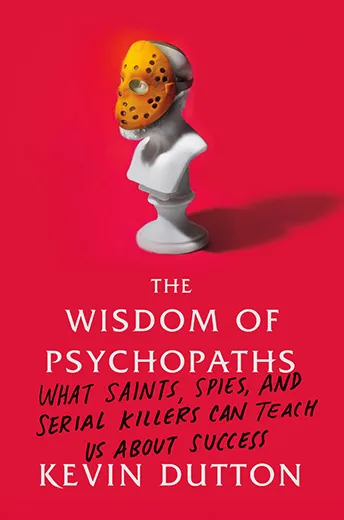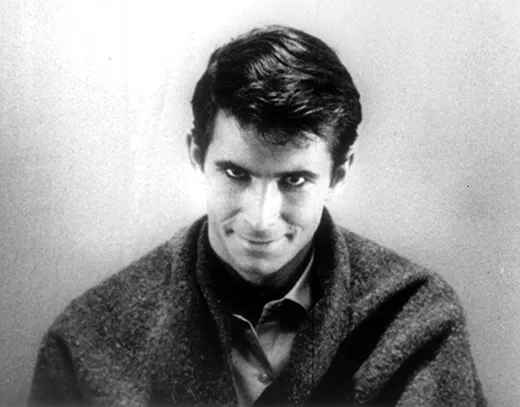The Pros to Being a Psychopath
In a new book, Oxford research psychologist Kevin Dutton argues that psychopaths are poised to perform well under pressure
/https://tf-cmsv2-smithsonianmag-media.s3.amazonaws.com/filer/Psychopath-Norman-Bates-631.jpg)
When most of us hear the word “psychopath,” we imagine Hannibal Lecter. Kevin Dutton would prefer that we think of brain surgeons, CEOs and Buddhist monks. In his new book, The Wisdom of Psychopaths: What Saints, Spies and Serial Killers Can Teach Us About Success, the Oxford research psychologist argues that psychopathic personality traits—charm, confidence, ruthlessness, coolness under pressure—can, in the right doses, be a good thing. Not all psychopaths are violent, he says, and some of them are just the sort of people society can count on in a crisis.
To further his psychopathic studies, Dutton is seeking participants for his Great American Psychopath Survey, which he says will reveal the most psychopathic states, cities and professions in the United States. Try it for yourself at wisdomofpsychopaths.com.
“Psychopath” is a term that gets thrown about a lot in our culture. Are psychopaths misunderstood?
It’s true, no sooner is the word “psychopath” out than images of your classic psychopathic killers like Ted Bundy and Jeffrey Dahmer and a whole kind of discreditable raft of senior politicians come kind of creeping across our minds. But actually, being a psychopath doesn’t mean that you’re a criminal. Not by default, anyway. It doesn’t mean that you’re a serial killer, either.
One of the reasons why I wrote the book in the first place was to debunk two deep-seated myths that the general public have about psychopaths. Firstly, that they’re either all “mad or bad.” And secondly, that psychopathy is an all-or-nothing thing, that you’re either a psychopath or you’re not.
What is a psychopath, anyway?
When psychologists talk about psychopaths, what we’re referring to are people who have a distinct set of personality characteristics, which include things like ruthlessness, fearlessness, mental toughness, charm, persuasiveness and a lack of conscience and empathy. Imagine that you tick the box for all of those characteristics. You also happen to be violent and stupid. It’s not going to be long before you smack a bottle over someone’s head in a bar and get locked up for a long time in prison. But if you tick the box for all of those characteristics, and you happen to be intelligent and not naturally violent, then it’s a different story altogether. Then you’re more likely to make a killing in the market rather than anywhere else.
How are these psychopathic traits particularly useful in modern society?
Psychopaths are assertive. Psychopaths don’t procrastinate. Psychopaths tend to focus on the positive. Psychopaths don’t take things personally; they don’t beat themselves up if things go wrong, even if they’re to blame. And they’re pretty cool under pressure. Those kinds of characteristics aren’t just important in the business arena, but also in everyday life.
The key here is keeping it in context. Let’s think of psychopathic traits—ruthlessness, toughness, charm, focus—as the dials on a [recording] studio deck. If you were to turn all of those dials up to max, then you’re going to overload the circuit. You’re going to wind up getting 30 years inside or the electric chair or something like that. But if you have some of them up high and some of them down low, depending on the context, in certain endeavors, certain professions, you are going to be predisposed to great success. The key is to be able to turn them back down again.
You’ve found that some professions rate higher than others when it comes to psychopathic traits. Which jobs attract psychopaths?
I ran a survey in 2011, “The Great British Psychopath Survey,” in which I got people to fill out a questionnaire online to find out how psychopathic they were. I also got people to enter their occupations, what they did for a living, and how much money they earned over the course of a year. We found a whole range of professions cropping up—no serial killers among them, although no one would admit to it. The results made very interesting reading, especially if you’re partial to a sermon or two on a Sunday, because the clergy cropped up there at number eight. You had the usual suspects at the top; you had your CEOs, lawyers, media—TV and radio. Journalists were a bit down the list. We also had civil servants. There were several police officers, actually, so as opposed to being criminals, some psychopaths are actually out there locking other people up. Any situation where you’ve a got a power structure, a hierarchy, the ability to manipulate or wield control over people, you get psychopaths doing very well.
What would be a bad career choice for a psychopath? Which professions scored low?
No real surprises, actually. There were craftsmen, care workers. Nurses were in there. Accountants were pretty low on psychopathy. One of the interesting ones: doctors. Doctors were low on psychopathy, but surgeons were actually in the top ten, so there’s kind of a dividing line between surgeons and doctors.
Can psychopaths have a positive impact on society, as opposed to just using their advantages to get ahead?
I’ve interviewed a lot of special forces troops, especially the British Special Air Service. They’re like Navy Seals. That’s a very good example of people who are pretty high on those psychopathic traits who are actually in a perfect occupation. Also, I interview in the book a top neurosurgeon—this was a surgeon who takes on operations that are especially risky—who said to me, “The most important thing when you’re conducting a dangerous operation, a risky operation, is you’ve got to be very cool under pressure, you’ve got to be focused. You can’t have too much empathy for the person that you’re operating on, because you wouldn’t be able to conduct that operation.” Surgeons do very nasty things to people when they’re on the operating table. If things do go wrong, the most important facet in a surgeon’s arsenal is decisiveness. You cannot freeze.
You noted in the book that you’re not a psychopath yourself. Despite my profession, I scored pretty low on your survey as well. Can “normals” like you and me learn to develop these psychopathic traits, even if we don’t have them naturally?
Absolutely. Normal people can work out their psychopath muscles. It’s kind of like going to the gym in a way, to develop these attributes. It’s just like training.
Psychopaths don’t think, should I do this or shouldn’t I do this? They just go ahead and do stuff. So next time you find yourself putting off that chore or filing that report or something, unchain your inner psychopath and ask yourself this: “Since when did I need to feel like something in order to do it?”
Another way you can take a leaf out of a psychopath’s book: Psychopaths are very reward-driven. If they see a benefit in something, they zone in on it and they go for it 100 percent. Let’s take an example of someone who is kind of scared of putting in for a raise at work. You might be scared about what the boss might think of you. You might think if you’d don’t get it you’re going to get fired. Forget it. Cut all that stuff off. “Psychopath up,” and overwhelm your negative feelings by concentrating on the benefits of getting it. The bottom line here is, a bit of localized psychopathy is good for all of us.
You just came back to England this week from the Himalayas. Did that trip have anything to do with your research into psychopaths?
I was running a rather odd study over there. Psychopaths and Buddhists, in terms of their performance in the lab, have certain characteristics in common. They’re good at living in the present. They’re mindful. Both are calm under pressure. They focus on the positive. But also, both are good at mind reading. They’re very good at picking up on micro-expressions, basically lightning-fast changes in facial scenery; our brain downloads onto the muscles of our face before it decides on the real picture that it wants to project to the world. These micro-expressions are invisible to most of our naked eyes. But it seems that expert Buddhist meditators are able to pick them up, probably because they are able to slow down their perception. There’s a recent study that seems to show that psychopaths are also good at picking up on micro-expressions. We don’t really know the reason for that, but it could be that psychopaths might spend more time just studying us.
What I did was I hot-footed it over the mountains of Northern India on the Tibet border with a laptop. On the laptop were 20 “pleader videos”—clips of press conferences organized by the police where you’ve got folks pleading with the general public for information as to loved ones who’ve gone missing. We know that 10 of these guys have actually done the deed themselves, and 10 people are genuine pleaders. I put them on a laptop, basically took them to the mountains, caves and remote cabins of these expert Buddhist meditator monks in the high Himalayas, and got them to tell me which of the 20 were false and which were true. I’ll be testing psychopaths very shortly, and I am going to see who gets more out of 20. Is it the Buddhist monks, or is it the psychopaths?
It was an epic journey. If you don’t like heights and you have a nervous disposition—we’re talking about foot-width edges, thousand-meter drops. Pretty dicey. I mean, you have to be a bit of a psychopath to get to these guys.
This interview series focuses on big thinkers. Without knowing whom we will interview next, only that he or she will be a big thinker in their field, what question do you have for our next interview subject?
Ask them to take my test and tell me what they score. How psychopathic do they think they are?
Our last interviewee, Alison Dagnes, a political scientist whose book, A Conservative Walks Into a Bar, looks at the liberal bias in political satire, asks: What is your work going to mean for the future?
There was a story in the news not too long ago in which there was a U.S. computer company that deliberately advertised for people who have Asperger’s-like traits, because they know these people are very, very good at focusing on data and seeing patterns. So perhaps one of the things that could happen in the future is that certain kinds of industries might actually deliberately screen for people whose psychopath dials are turned up more than normal.
/https://tf-cmsv2-smithsonianmag-media.s3.amazonaws.com/accounts/headshot/amy.png)



/https://tf-cmsv2-smithsonianmag-media.s3.amazonaws.com/accounts/headshot/amy.png)